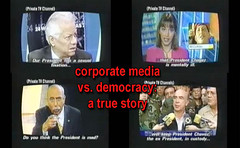
Every poll taken of Iraqis has said essentially the same thing.
What Iraqis Want
More Professor Smartass on Iraqi opinion
The news here is that these results come from focus groups conducted by the US military.
So if your righty friends disagree with this, you can tell them they are calling the troops liars.
The other significant thing is that the military has signed contracts with Gallup to do four polls a month. Both Republicans and most Democrats in Congress have either been silent about what the Iraqis think of our occupation or blatantly lied.
The related lie is that Iraq must be divided to restore peace and that Iraqis want that. Polls show most Iraqis want ONE country, and much of the sectarian violence is likely instigated by Saudi foreign fighters, since more come from Saudi than almost all other countries combined according to Israeli and Saudi studies.
Clearly, the Iraqis want us to leave, Americans overwhelmingly want us to leave, and the military is publicizing data that makes the case for pulling out.
Who exactly are we teaching democracy by staying?
KEY EXCERPTS:
washingtonpost.com
All Iraqi Groups Blame U.S. Invasion for Discord, Study Shows
By Karen DeYoung
Washington Post Staff Writer
Wednesday, December 19, 2007; A14
Iraqis of all sectarian and ethnic groups believe that the U.S. military invasion is the primary root of the violent differences among them, and see the departure of "occupying forces" as the key to national reconciliation, according to focus groups conducted for the U.S. military last month.
That is good news, according to a military analysis of the results. At the very least, analysts optimistically concluded, the findings indicate that Iraqis hold some "shared beliefs" that may eventually allow them to surmount the divisions that have led to a civil war.
***
Even though members of the military "understand the limitations" of polling data, Rapp said, "subjective measures" are an important part of the mix. In July, the military signed a contract with Gallup for four public opinion polls a month in Iraq: three nationwide and one in Baghdad. Lincoln Group, which has conducted surveys for the military since shortly after the invasion, received a year-long contract in January to conduct focus groups.
Outside of the military, some of the most widespread polling in Iraq has been done by D3 Systems, a Virginia-based company that maintains offices in each of Iraq's 18 provinces. Its most recent publicly released surveys, conducted in September for several news media organizations, showed the same widespread Iraqi belief voiced by the military's focus groups: that a U.S. departure will make things better. A State Department poll in September 2006 reported a similar finding.
Matthew Warshaw, a senior research manager at D3, said that despite security improvements, polling in Iraq remains difficult. "While violence has gone down, one of the ways it has been achieved is by effectively separating people. That means mobility is limited, with roadblocks by the U.S. and Iraqi military or local militias," Warshaw said in an interview.
FULL TEXT
 |  |  |  |  |
















